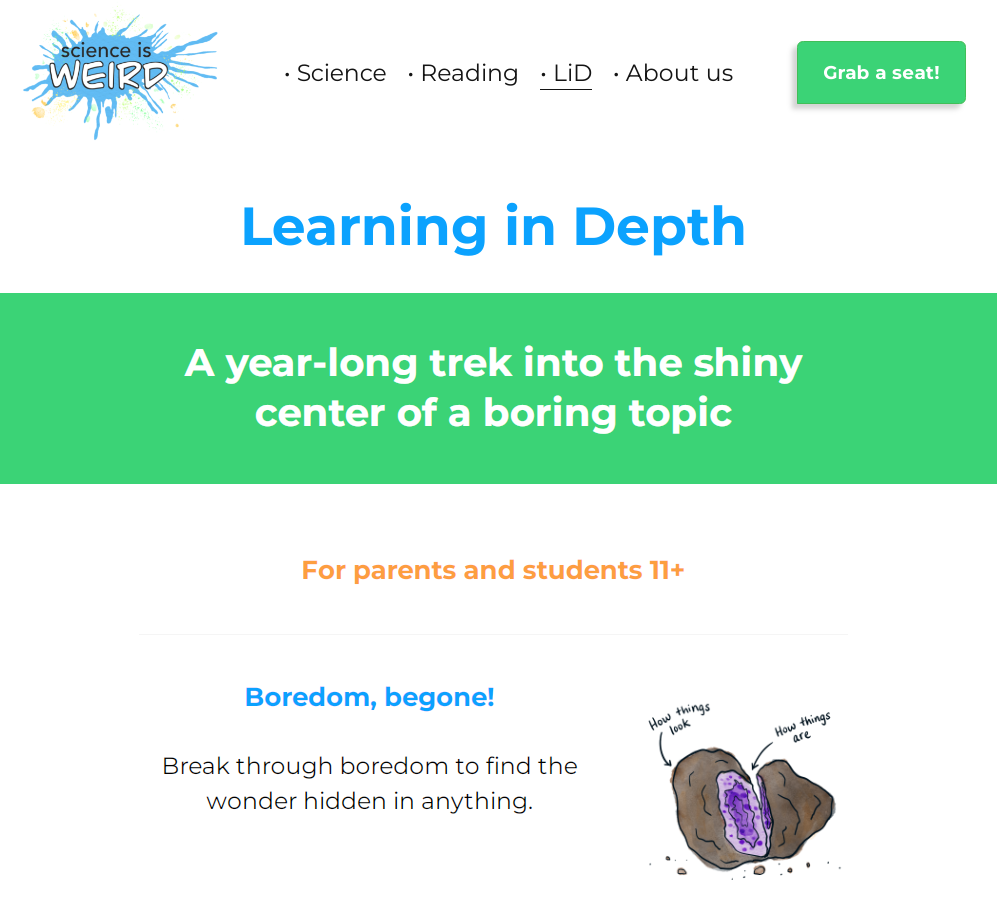Learning in Depth: A program that could transform education
What if school prepared students to be experts? Learning in Depth is a program aimed at answering this question. The idea is simple: at the beginning of primary school each student is randomly assigned a different topic that they will study for the next 12 years.
Here is Kieran Egan introducing the idea:
If you have any passing familiarity with either children or pedagogy I imagine your face is now frozen in horror, a scream of WHY? or perhaps NOOO! on your lips.
Why Learning in Depth?
Let me answer the ‘WHY?’ first:
Students are taught about all sorts of topics in school but they are unable to remember much of what they ‘learned’. There are all sorts of explanations for this problem, from bad teachers to bad students to stupid curriculum to poor delivery. The list of ailments goes on.
Kieran Egan posits that students are failing because they never achieve sufficient depth of knowledge to make subjects come alive. Because they barely scratch the surface of most school topics,1 students never become curious enough about the subject-matter to find it worthy of inquiry.
Assigning students a random topic is reflects one Egan’s key concepts, that
“… indeed, everything in the world is wonderful, but that schools are designed almost to disguise this slightly shameful fact. We represent the world to children as mostly known and rather dull. The opposite is the case: we are surrounded by mystery, and what we know is fascinating.”
The idea is to cultivate within the learner a sense of agency, that any topic could not be approachable, but transformative. The long time horizon gives students a chance to get bored with their topic, to fall into and out of love with it many times. This sort of long-term engagement is intended to build a personal connection with the content and to highlight the intrinsic pleasure of learning.1
Knowing one topic very well provides a number of ancillary benefits. By understanding just how much there is to learn, students not only develop epistemic humility, but also a better sense of what deep knowledge looks like from the inside.
Learning in Depth isn’t meant to replace the school curriculum but to enrich it, helping students to see what mastery looks like and then apply this understanding to new information and ideas.
What does LiD involve?
But what could you possibly teach for 12 years??? I hear you in the back. Essentially this is project or inquiry-based learning the Egan way. Students are free to engage with their topic in any number of ways, but teachers provide suggested activities based on Egan’s cognitive tools and stages of understanding.
If you’re curious what this might look like in practice, you are in luck. I recently joined a Learning in Depth summer cohort run by Brandon Hendrickson and Alessandro Gelmi. It was basically a survey of Learning in Depth using Egan techniques running the gamut from somatic understanding (think pre-literate) to philosophic understanding (reading scholarly research papers). The tasks range from short, thought provoking inquiries (find Guinness-style world records on your topic) to more involved quests like developing a full-on business plan related to your topic, My next post will be on my experiences with LiD, but let me give a quick spoiler: it was an incredible experience that changed my relationship with teaching.
If you are interested, there is a 30-week online Learning in Depth cohort starting next month. In fact, I have taken a role as a course mentor the upcoming cohort. I feel honored for the opportunity and am so excited to share the program with the world. You can learn more about it here:
How could this transform education?
I think that this approach, if successfully implemented, could help to show children why learning matters. Not just to get a job, or signal relative status or to get parents and teachers off their back, but a way to redefine one’s relationship with the world.
These are big claims, but are they borne out? LiD has been tried by at least 100,000 kids in schools around the world. I have reached out to a few educators involved and hope to learn more about outcomes. One of the biggest difficulties in education is finding evidence that can be attributed directly to any given intervention - people are such confoundingly complex variables! Still I am interested in gathering evidence about how LiD has fared in school and home classrooms worldwide.
Just this week a new AI model was released that has the ability to reason in multiple domains and solve problems like PhD graduate. The world is changing very quickly and young people will need to agency, motivation and imaginative problem-solving if they plan to have an effect on the world. Schools aren’t developing these abilities consistently enough and many of the skills we do teach are becoming obsolete. Casual and shallow awareness of a broad sampling of information won’t be enough. Maybe infusing education with a bit more wonder and a bit more depth could help. I certainly think the potential rewards are worth chasing.
- Difficult to do when many subjects only span a week-long survey, perhaps a month at best.
- Egan argues that schools often prevent students from understanding the pleasure of learning. Information is set up like a series of hurdles to be overcome in order to achieve a test outcome and then forgotten. Vocational training sometimes achieves greater levels of depth but this isn’t the answer either because it is inherently tied to the extrinsic motivation of getting a job.




Comments
Post a Comment